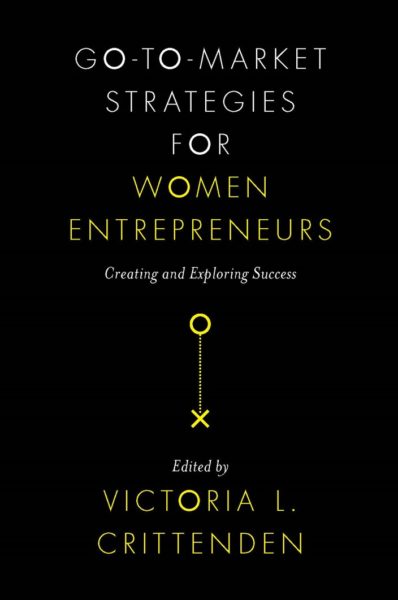7 Go-to-Market Strategies for Women Entrepreneurs

Growing up, Victoria Crittenden remembers how hard her mother worked. A mother of eight, she made money where she could, whether sewing, cleaning the church, or ironing clothes.
Eventually, she sold cosmetics for Avon, thriving as she built her business and the family’s financial situation improved. “I saw firsthand how my mama’s self-confidence grew as she became a business woman,” says Crittenden, a professor of marketing at Babson College.

Crittenden’s entrepreneurial mother is the inspiration for a new book, Go-to-Market Strategies for Women Entrepreneurs: Creating and Exploring Success, that Crittenden edited. “This book is about empowering women,” she says.
Nearly 40 scholars and practitioners from Babson and around the world contributed to the book, which explores the power and potential of female entrepreneurship. Here are some tips and go-to-market strategies they offer for women looking to build and grow their ventures.
Support Each Other
Look to other women. Together, you can bolster each other in a variety of ways, including as role models, investors, and builders of supportive entrepreneurial communities.
“Instead of the ‘old boy’s network,’ women need to build and establish a plentiful ‘old girl’s network’ to promote and sustain women’s entrepreneurship around the world,” writes Lakshmi Balachandra, assistant professor of entrepreneurship at Babson, and Prabha Dublish ’18, co-founder and president of Womentum, a crowdfunding platform for women entrepreneurs in developing countries.
Find Funding
Obtaining financial backing remains a greater challenge for women entrepreneurs than it is for their male counterparts. According to the latest Diana International Impact Report, less than 3% of all companies funded by venture capital have a woman CEO.
Candida Brush, Babson’s vice provost of global entrepreneurial leadership, offers three funding strategies for women entrepreneurs. One, seek out women investors, who are more likely to invest in women-run businesses. Two, give investors confidence to support you by emphasizing your executive experience, education, and other qualifications. And three, understand that investors want to back companies with potential for growth, so make sure to outline your growth strategy.
Make a Difference
Women entrepreneurs have the ability to make a great difference in the world.
Lauren Beitelspacher, associate professor of marketing at Babson, writes about a number of women entrepreneurs who are striving to change the fashion industry by offering sustainable clothes that are durable, affordable, and attractive. “(They) are changing the way products are made and, in doing so, hoping to change the way consumers shop,” writes Beitelspacher.
Know Your Customer
The co-founder, president, and CEO of Ceja Vineyards, Amelia Ceja is a woman leader in an industry dominated by men. In examining Ceja’s career, Anjali Bal, assistant professor of marketing at Babson, and Kelly Weidner, assistant professor of marketing at Saint Mary’s College of California, discovered what has driven her success.
Ceja understands her customers and pushed to target people of color, who were usually disregarded by the wine industry. Her mentor had advised her against making that move. She ignored his advice.
“Instead of the ‘old boy’s network,’ women need to build and establish a plentiful ‘old girl’s network’ to promote and sustain women’s entrepreneurship around the world.”
Lakshmi Balachandra and Prabha Dublish ’18
Build Your Personal Brand
The brands of some women entrepreneurs are not a product or service but themselves. Faith Salie, for instance, harnessed her creative voice to become a popular author, podcast host, and regular on “Sunday Morning” on CBS and NPR’s “Wait Wait… Don’t Tell Me!”
Interviewed by Bal and Weidner, she revealed four strategies for personal brand building: know who you are (be honest with your fans), build relationships (connect with people who can help you), fail and learn from mistakes (stay positive and try again), and be kind and gracious (express gratitude to those who help you).
Act First, If Need Be
Recognize that women entrepreneurs around the world approach their businesses differently. Often in the U.S., they study and plan before they launch a venture.
In the developing world, though, many women entrepreneurs don’t have the luxury of time, and they start their ventures, not because they identified an untapped opportunity, but out of sheer necessity. “They act in order to gain insights for subsequent actions,” writes Vincent Onyemah, associate professor of marketing at Babson, and Martha Rivera Pesquera, professor in the marketing management department at IPADE Business School.
Be Passionate
Find the fire inside you. Crittenden and Kimberly Harris Bliton, senior director of academic initiatives at the Direct Selling Education Foundation, profile three women entrepreneurs who lead direct-selling businesses and see how authentic, committed, and passionate they are. They believe strongly in their products and the people who sell them.
“It only takes seconds into conversations,” write Crittenden and Bliton, “for their passion for the business and passion for their employees and direct selling sales people to become evident.”
Posted in Insights






